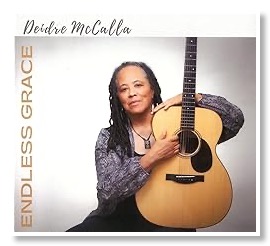May 2024
The Power of Music

Jupiter Index: Were there any musicians whom you initially wanted to play like, or did you always want to craft your own sound?
Deidre McCalla: My heroes when I discovered the world of folk music were Joan Baez, Joni Mitchell, Judy Collins, Dylan, Eric Anderson, Simon & Garfunkel and many more. I taught myself how to play guitar by learning their songs and like every performer starting out most of my bar and coffeehouse sets were made up of covers. When I began writing songs it was not so much to find my own ’sound’ but to emulate what most of my heroes did - write the songs they sung.
JI: You have been creating music for over five decades. What has been the biggest change you’ve seen in the industry during this time?
DM: The biggest change in the industry was the introduction of the CD. With that music became digital and it opened up a Pandora’s box of issues with copying, sharing, and ultimately poorly compensated streaming. We’re still trying to figure it all out.
JI: You have an impressive body of work; what is your main inspiration when writing and recording your albums?
DM: Writing and recording are two very different experiences for me. I write songs because it is my way of figuring out the world around me. To put everything into an understandable perspective. I sing because singing aligns my senses. It makes me feel whole. I record albums because you need to have an album if you want to tour and perform live. An album is a very expensive calling card.
JI: How would you describe your writing process? How often do you write songs?
DM: My writing process is sporadic. I do not write often enough by some measure. On the other hand, I haven’t fallen into the trap of thinking every journal entry is a song so there’s that.
JI: So, back to the beginning. Where does your interest in music stem from?
DM: My gateway drug was performing. I have been a ham from an early age. Motown filled the home in which I grew up and then I discovered folk music while attending a boarding high school. I think that’s why my playing and songs have a stronger rhythmic feel than is typical of most singer-songwriters.
JI: Would you like to say anything more about your music or to your fans?
DM: I marvel that I get to do this work. At a music conference workshop I attended we were encouraged to write down what we wanted the audience to get out of a show. I reflected on a Bonnie Raitt concert I had recently gone to with my son and how absolutely great I felt when the concert was over. I realized that’s how I hoped my audiences felt. On the most basic level i hope they felt it was worth the price of admission; money well spent. i hope they felt glad to be alive and to have shared that time with me. I hope they believe that life is a great adventure and though some parts are hard there is beauty and joy to be found. That is why I do this.
by G.M. Burns


